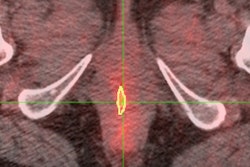A shortened, higher-dose radiation therapy (RT) protocol is safe for low-risk prostate cancer patients and is associated with lower costs and similar quality-of-life outcomes, according to research presented at the recent American Society for Radiation Oncology (ASTRO) meeting in Boston.
Lead researcher Deborah Bruner, PhD, of Emory University and colleagues conducted a phase III randomized study that compared standard-dose radiation therapy with a radiation therapy schedule that used higher doses in fewer treatments.
The study included 962 patients randomized into one of two protocols: a conventional schedule that consisted of 3D intensity-modulated radiation therapy (IMRT) at 73.8 Gy in 41 fractions over 8.2 weeks, or a shortened schedule of 3D IMRT at 70 Gy in 28 fractions over 5.6 weeks.
The researchers assessed patients' quality of life at baseline, six months, and 12 months using the Expanded Prostate Cancer Index Composite (EPIC) tool. They found that patients treated with the shortened IMRT schedule showed a small, but not clinically significant, decline in bowel quality of life at 12 months, compared with the conventional therapy schedule. The results suggest that the toxicity effects are comparable for bowel, bladder, and sexual quality of life between the two protocols, according to Bruner and colleagues.
The trial was performed under the auspices of NRG Oncology, which conducts clinical trials that focus on gender-specific malignancies, including gynecologic, breast, and prostate cancers. Founded in 2012, it integrates the research of the National Adjuvant Breast and Bowel Project, the Radiation Therapy Oncology Group, and the Gynecologic Oncology Group. The study was funded by grants from the U.S. National Cancer Institute, NRG Oncology said.

















